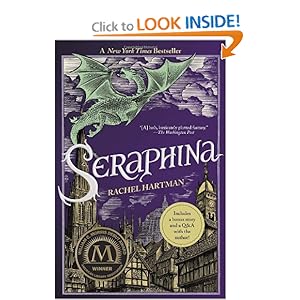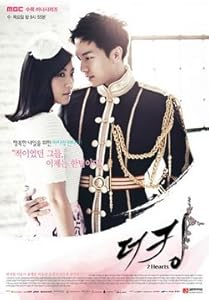War and peace is a recurring theme in literature, in movies and television, and in history. Seraphina, winner of the Cybil Award of 2012 in the Young Adult Science Fiction and Fantasy category, is about trust and mistrust between two different species, dragons and humans, in the kingdom of Goredd. My latest (second) K-drama, The King 2 Hearts, is about war and peace, trust and mistrust, between North and South Korea. Both the book and the TV series share some commonalities:
Tough-as-nails, but tender on the inside commoner girl meets insecure, but charming prince. Romance ensues.
Cultural differences create misunderstandings and lead two nations to the brink of war.
Evil villain tries to provoke war between the two groups.
Relationship between the girl and the prince mirrors the uneasy relationship between the two countries. Danger lurks everywhere, and almost all of the main characters come near to death multiple times in both Seraphina and King 2 Hearts.
 There are also differences between the two stories. In the book, the dragons are emotionless, mathematical, and super-rational, unless they have taken on human form in which case they must be on guard against getting tripped up by human emotions. Yes, the dragons can transform into human bodies. (No, the humans can’t get dragon bodies–which doesn’t seem quite fair.) And Seraphina, our young protagonist, has a very special problem: she hides a secret that would, if revealed, turn everyone, both dragon and human against her and perhaps cost her life.
There are also differences between the two stories. In the book, the dragons are emotionless, mathematical, and super-rational, unless they have taken on human form in which case they must be on guard against getting tripped up by human emotions. Yes, the dragons can transform into human bodies. (No, the humans can’t get dragon bodies–which doesn’t seem quite fair.) And Seraphina, our young protagonist, has a very special problem: she hides a secret that would, if revealed, turn everyone, both dragon and human against her and perhaps cost her life.
So, there’s a lot of interplay in Seraphina between the supposed opposite ways of viewing life: artistic and emotional or mathematical and rational. Unfortunately, Mr. Spock and Captain Kirk did it better. The idea of bridging cultural differences and making peace by bringing together two cultures is more interesting. Seraphina brings together the two cultures in the book because she has a unique identity, (POSSIBLE SPOILER) half dragon and half human. In King 2 Hearts the attempt to bridge two cultures is embodied in the proposed marriage of the South Korean prince to a North Korean bride. Of course, reconciling two disparate cultures is difficult, whether it’s an internal conflict or recurring discord and confrontation between two people who actually love each other.
 It’s the conflict that keeps the story fresh and compelling. King 2 Hearts consists of 20 episodes, a length that I’m told is common for Korean dramas. It probably could have been improved by being shortened by about five episodes and tightened up. Some of the characters—the “psycho” super-villain, his stoned hired assassin, and the U.S. government official with the speech impediment, in particular–were rather unbelievable and cringe-worthy. But the series itself was addictive; I kept thinking I’d watch just one more episode, then one more, then one more . . .
It’s the conflict that keeps the story fresh and compelling. King 2 Hearts consists of 20 episodes, a length that I’m told is common for Korean dramas. It probably could have been improved by being shortened by about five episodes and tightened up. Some of the characters—the “psycho” super-villain, his stoned hired assassin, and the U.S. government official with the speech impediment, in particular–were rather unbelievable and cringe-worthy. But the series itself was addictive; I kept thinking I’d watch just one more episode, then one more, then one more . . .
If you want some (mostly clean) romance embedded in a story with Important Stuff to Say about war and peace I’d recommend Seraphina if you have a few hours to read a fantasy novel, and King 2 Hearts only if you have about twenty hours to invest in a roller-coaster of a TV show, with sub-titles and loads of Korean politics, mores and traditions. Consume both if you’re a glutton for political drama, fantasy, spy thrillers, romantic sparring, and a surprising but satisfactory resolution.
I hope to write more about King 2 Hearts and the other K-drama that I’ve watched, Queen In-hyun’s Man, soon. Suffice it to say I think I already have a K-drama problem, and I can’t, can’t, can’t start any more shows anytime soon or else I might be accused of family-neglect.
Related links:
Steph Su reviews Seraphina.
The Readventurer reviews Seraphina.
Charlotte’s Library on Seraphina.
With an Accent: The King 2 Hearts.
The Common Room: A Few of my Favorite Korean Dramas.